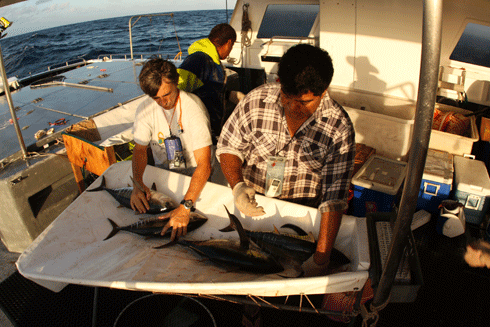
|
Published: 12 March 2013
Training program to monitor Pacific tuna fishery at risk
Pacific fisheries delegates have expressed concern about funding cuts that threaten training for tuna compliance observers. Collecting samples is crucial for the tuna industry, which is worth $US5 billion a year.

|
|
See our earlier article for more about SPC’s work with Pacific island nations for a sustainable tuna fishery. Credit:
Malo Hosken/SPC
|
At a recent Heads of Fisheries meeting convened by the Secretariat of the Pacific Community (SPC) in Noumea, the delegates argued strongly for a continuation of the observer training program. The meeting brought together heads of fisheries departments from countries and territories around the Pacific.
Observers work on board fishing vessels where they take samples of tuna and record the size, type and catch location of the fish. This is part of a major scientific program to monitor the health of the tuna industry in the Pacific.
Mr Mike Batty, Director of SPC’s Fisheries Program, says the tuna industry is worth $US5 billion a year.
‘Tuna fishing is a huge industry, and provides employment and a source of income to Pacific nations,’ he says.
‘This at-sea-monitoring is vital to keep the tuna industry in good shape. Industry already pays many direct costs of observer placement but it will take time to get them to absorb training costs.’
Before taking up positions on board ship, observers work through a rigorous training program. This training is carried out by SPC, and funded by donations from New Zealand and the European Union.
Some funding is due to end this year and another part in 2014. This threatens the capacity of SPC to offer training programs.
Sione Matoto, Director of Tonga’s Ministry of Agriculture & Food, Forestry and Fisheries, says the work of collecting samples is important to the tuna industry.
‘I would like NZ and the EU to continue to provide some support for the training program,’ he says. ‘It provides employment in Tonga, and there are issues of compliance in the tuna industry.’
Peter Sharples, SPC’s Observer Development and Support Coordinator, says there is a great need for consistent observer training that fits into regional data management requirements.
‘All the facts and figures are sent through to SPC head office to create a big picture of what’s happening in the tuna industry. We have to meet new requirements given by the Fisheries Commission.
‘We need more observers quickly, but our aim is to help Pacific countries train their own observers.’
Source: SPC



